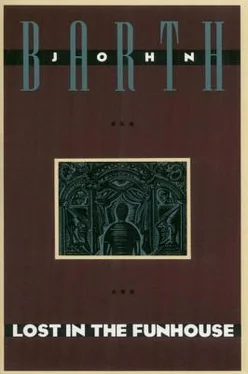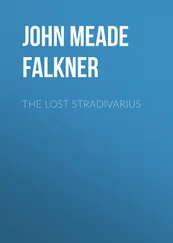John Barth - Lost in the Funhouse
Здесь есть возможность читать онлайн «John Barth - Lost in the Funhouse» весь текст электронной книги совершенно бесплатно (целиком полную версию без сокращений). В некоторых случаях можно слушать аудио, скачать через торрент в формате fb2 и присутствует краткое содержание. Год выпуска: 2014, ISBN: 2014, Издательство: Knopf Doubleday Publishing Group, Жанр: Современная проза, на английском языке. Описание произведения, (предисловие) а так же отзывы посетителей доступны на портале библиотеки ЛибКат.
- Название:Lost in the Funhouse
- Автор:
- Издательство:Knopf Doubleday Publishing Group
- Жанр:
- Год:2014
- ISBN:978-0-8041-5250-1
- Рейтинг книги:3 / 5. Голосов: 1
-
Избранное:Добавить в избранное
- Отзывы:
-
Ваша оценка:
- 60
- 1
- 2
- 3
- 4
- 5
Lost in the Funhouse: краткое содержание, описание и аннотация
Предлагаем к чтению аннотацию, описание, краткое содержание или предисловие (зависит от того, что написал сам автор книги «Lost in the Funhouse»). Если вы не нашли необходимую информацию о книге — напишите в комментариях, мы постараемся отыскать её.
Lost in the Funhouse — читать онлайн бесплатно полную книгу (весь текст) целиком
Ниже представлен текст книги, разбитый по страницам. Система сохранения места последней прочитанной страницы, позволяет с удобством читать онлайн бесплатно книгу «Lost in the Funhouse», без необходимости каждый раз заново искать на чём Вы остановились. Поставьте закладку, и сможете в любой момент перейти на страницу, на которой закончили чтение.
Интервал:
Закладка:
But now stern and solemn horns empowered the theme; abject no more, it grew rich, austere. Cymbals struck and sizzled. He was Odysseus steering under anvil clouds like those in Nature’s Secrets. A reedy woodwind warned of hidden peril; on guard, he crept to the closet with the plucking strings.
“Quick!” he hissed to his corduroy knickers inside, who were the undeserving Wimpy. If they could tiptoe from that cave before the lean hounds waked …
“But why are you saving my life?”
“No time for talk, Wimp! Follow me!”
Yet there! The trumpets flashed, low horns roared, and it was slash your way under portcullis and over moat, it was lay about with mace and halberd, bearing up faint Peggy on your left arm while your right cut a swath through the chain-mailed host. And at last, to the thrill of flutes, to the high strings’ tremble, he reached the Auditorium. His own tunic was rent, red; breath came hard; he was more weary than exultant.
“The truth of the matter is,” he declared to the crowd, “I’m just glad I happened to be handy.”
But the two who owed him their lives would not be gainsaid! Before the assembled students and the P.T.A. Wimpy James begged his pardon, while Peggy Robbins — well, she hugged and kissed him there in front of all and whispered something in his ear that made him blush! The multitude rose to applaud, Father and Mother in the forefront, Uncle Karl, Uncle Konrad, and Aunt Rosa beside them; Peter winked at him from the wings, proud as punch. Now brass and strings together played a recessional very nearly too sublime for mortal ears: like the word beyond , it sounded of flight, of vaulting aspiration. It rose, it soared, it sang; in the van of his admirers it bore him transfigured from the hall, beyond, beyond East Dorset, aloft to the stars.
For all it was he and not his brother who had suggested the gang’s name, the Occult Order of the Sphinx judged Ambrose too young for membership and forbade his presence at their secret meetings. He was permitted to accompany Peter and the others down to the rivershore and into the Jungle as far as to the Den; he might swing with them on the creepers like Tarzan of the Apes, slide down and scale the rooty banks; but when the Sphinxes had done with playing and convened the Occult Order, Peter would say “You and Perse skeedaddle now,” and he’d have to go along up the beach with Herman Goltz’s little brother from the crabfat-yellow shacks beside the boatyard.
“Come on, pestiferous,” he would sigh then to Perse. But indignifying as it was to be put thus with a brat of seven, who moreover had a sty in his eye and smelled year round like pee and old crackers, at bottom Ambrose approved of their exclusion. Let little kids into your Occult Order: there would go your secrets all over school.
And the secrets were the point of the thing. When Peter had mentioned one evening that he and the fellows were starting a club, Ambrose had tossed the night through in a perfect fever of imagining. It would be a secret club-that went without saying; there must be secret handshakes, secret passwords, secret initiations. But these he felt meant nothing except to remind you of the really important thing, which was — well, hard to find words for, but there had to be the real secrets, dark facts known to none but the members. You had to have been initiated to find them out — that’s what initiation meant — and when you were a member you’d know the truth of the matter and smile in a private way when you met another member of the Order, because you both knew what you knew. All night and for a while after, Ambrose had wondered whether Peter and the fellows could understand that that was the important thing. He ceased to wonder when he began to see just that kind of look on their faces sometimes; certain words and little gestures set them laughing; they absolutely barred outsiders from the Jungle and said nothing to their parents about the Occult Order of the Sphinx. Ambrose was satisfied. To make his own position bearable, he gave Perse to understand that he himself was in on the secrets, was in fact a special kind of initiate whose job was to patrol the beach and make sure that no spies or brats got near the Den.
By the time he came downstairs from changing his clothes Peter and the gang had gone on ahead, and even at a run he couldn’t catch up to them before they had got to the seawall and almost into the Jungle. The day was warm and windy; the river blue-black and afroth with whitecaps. Out in the channel the bell buoy clanged, and the other buoys leaned seaward with the tide. They had special names, red nun, black can, and sailors knew just what each stood for.
“Hey Peter, hold up!”
Peter turned a bit and lifted his chin to greet him, but didn’t wait up because Herman Goltz hit him one then where the fellows did, just for fun, and Peter had to go chase after him into the Jungle. Sandy Cooper was the first to speak to him: they called him Sandy on account of his freckles and his red hair, which was exactly as stiff and curly as the fur of his Chesapeake Bay dog, but there was something gritty too in the feel of Sandy Cooper’s hands, and his voice had a grainy sound as if there were sand on his tonsils.
“I hear you run home bawling today.”
Sandy Cooper’s dog was not about, and Peter was. Ambrose said: “That’s a lie.”
“Perse says you did.”
“You did, too,” Perse affirmed from some yards distant. “If Wimpy was here he’d tell you.”
Ambrose reflected on their narrow escape from the Cave of Hounds and smiled. “That’s what you think.”
“That’s what I know, big sis!”
One wasn’t expected to take on a little pest like Perse. Ambrose shied a lump of dirt at him, and when Perse shied back an oystershell that cut past like a knife, the whole gang called it a dirty trick and ran him across Erdmann’s cornlot. Then they all went in among the trees.
The Jungle, which like the Occult Order had been named by Ambrose, stood atop the riverbank between the Nurses’ Home and the new bridge. It was in fact a grove of honey locusts, in area no larger than a schoolyard, bounded on two of its inland sides by Erdmann’s cornlot and on the third by the East Dorset dump. But it was made mysterious by rank creepers and honeysuckle that covered the ground and shrouded every tree, and by a labyrinth of intersecting footpaths. Jungle-like too, there was about it a voluptuous fetidity: gray rats and starlings decomposed where B-B’d; curly-furred retrievers spoored the paths; there were to be seen on occasion, stuck on twig-ends or flung amid the creepers, ugly little somethings in whose presence Ambrose snickered with the rest; and if you parted the vines at the base of any tree, you might find a strew of brown pellets and fieldmouse bones, disgorged by feasting owls. It was the most exciting place Ambrose knew, in a special way. Its queer smell could retch him if he breathed too deeply, but in measured inhalations it had a rich, peculiarly stirring savor. And had he dared ask, he would have very much liked to know whether the others, when they hid in the viny bowers from whoever was It, felt as he did the urging of that place upon his bladder!
With Tarzan-cries they descended upon the Den, built of drift-timber and carpet from the dump and camouflaged with living vines. Peter and Herman Goltz raced to get there first, and Peter would have won, because anybody beat fat Herman, but his high-top came untied, and so they got there at the same time and dived to crawl through the entrance.
“Hey!”
They stopped in mid-scramble, backed off, stood up quickly.
“Whoops!” Herman hollered. Peter blushed and batted at him to be silent. All stared at the entryway of the hut.
Читать дальшеИнтервал:
Закладка:
Похожие книги на «Lost in the Funhouse»
Представляем Вашему вниманию похожие книги на «Lost in the Funhouse» списком для выбора. Мы отобрали схожую по названию и смыслу литературу в надежде предоставить читателям больше вариантов отыскать новые, интересные, ещё непрочитанные произведения.
Обсуждение, отзывы о книге «Lost in the Funhouse» и просто собственные мнения читателей. Оставьте ваши комментарии, напишите, что Вы думаете о произведении, его смысле или главных героях. Укажите что конкретно понравилось, а что нет, и почему Вы так считаете.












